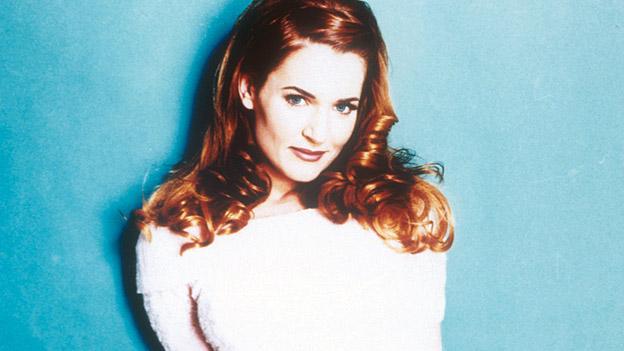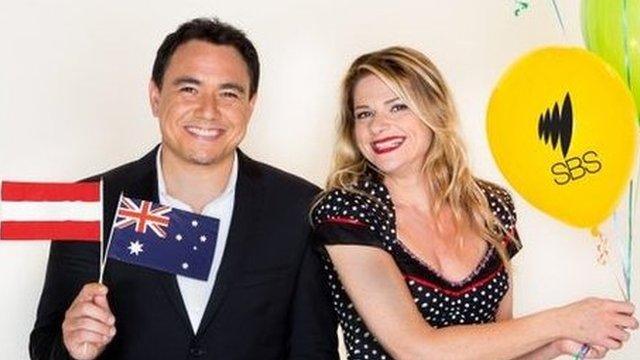Eurovision Song Contest: Australia to compete in 2015
- Published
Eurovision commentator Julia Zemiro told the BBC that details of Australia's act were still "secret"
Australia is to compete at this year's Eurovision Song Contest.
Organisers issued a one-off invitation as part of the contest's 60th anniversary celebrations.
"It's a daring and at the same time incredibly exciting move. It is our way of saying let's celebrate this party together!" contest supervisor Jon Ola Sand said.
Australia will be fast-tracked to the final, which will take place in Vienna, Austria, on 23 May.
A total of 40 countries will now compete in the contest.
The European Broadcasting Union said Australia had been given a wildcard for the final "to not reduce the chances" of the semi-final participants and because of the "one-off nature" of its participation.
Australia will be allowed to vote in both semi-finals, as well as the grand final. The possibility of allowing the public to have a 50% stake in the Australian vote through televoting is also being explored.
The other participating countries will be allowed to vote for the Australian entry - who has yet to be selected - however should their act win the contest, next year's show will be held in a European city and Australia will be allowed to defend its title.

Australian singer Gina G represented the UK at the Eurovision Song Contest in 1996
The show has a long tradition of being broadcast in Australia by broadcaster SBS.
"SBS has been broadcasting Eurovision for over 30 years and we have seen how Australians' love of the song contest has grown during those years," managing director Michael Ebeid said.
"We are very excited to have secured this historic opportunity for Australia to be represented on the world's biggest stage and are honoured that the European Broadcasting Union has supported us to achieve this ambition."
Host broadcaster ORF added: "With the participation of Australia, together with our partners at the EBU and SBS, we have succeeded to lift [Eurovision] to a new global level and to build another bridge for the 60th anniversary."
It is not the first time Australians have participated at the song contest.
Singer Jessica Mauboy - who appeared in the 2012 film The Sapphires - provided the interval entertainment at last year's contest.
Australians have also competed representing the UK - including the New Seekers, Gina G and Olivia Newton John - who lost to Swedish pop group Abba in 1974.


Analysis - Dr Paul Jordan, Eurovision expert
It might seem a little bizarre, but Eurovision doesn't always follow the rules of geography.
Many of the competitors are from outside of Europe, like Israel and Azerbaijan - and Morocco also entered in 1980.
Participation is defined by being a member of the European Broadcasting Union. Australian broadcaster SBS is a member, and they've broadcast it for 30 years.
Eurovision is hugely popular in Australia - three million watched it last year and they have a very loyal fanbase. This is a one-off: a way of saying thank you for the support, so come and join us for the 60th contest.
I think Kylie would make a fantastic participant, but the question is whether she'd do it or not. It would be interesting to see who Australia chooses - would a big artist with a credible career touch the contest? That's the difficultly we've had in the UK in recent years - it's seen as a poisoned chalice.
It would be a real coup if Australia won because it's supposed to be a one-off a light-hearted gimmick, but there's potential they could win.
It also demonstrates how strong the Eurovision brand is. As a TV format, it has existed for 60 years and it's hugely impressive. Other countries and continents have tried to emulate it, but it's never got off the ground.
What we've got here is a very special song contest that everyone has an opinion on whether they love it or hate it - it's really quite a nice idea of uniting Europe and, in the case of Australia, the world.
- Published11 February 2015

- Published11 May 2014

- Published11 May 2014
